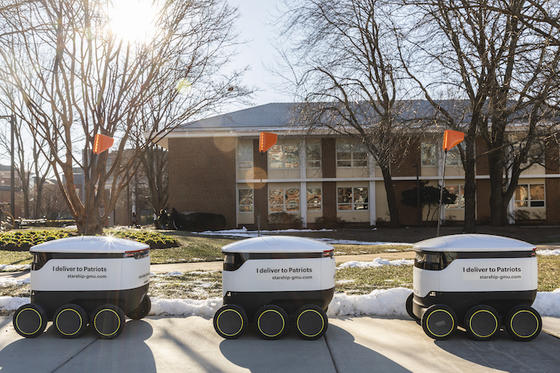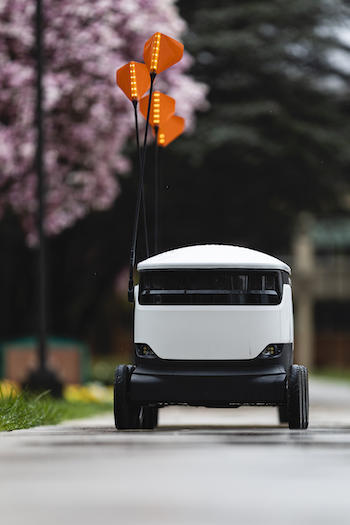
Just about every day, George Mason University resident student Clinton Carlson Jr. opens his Eastern Shore Hall door to greet a friend. Their visit is brief, and their sparse conversation one-sided, but they do share a momentary touch before going their separate ways.
With these interactions, Carlson Jr. isn’t violating social distancing norms, he’s following them. His frequent visitor is one of the Starship Robots that deliver food on the Fairfax Campus.
When Mason became the first university in the country to roll out this new take on meals on wheels in January 2019, the conveyances were regarded as a cool, convenient novelty that drew curious looks and garnered national media coverage. Now they are important contributors to Mason’s COVID-19 response.
The robots deliver coffee, food and other items from the Northern Neck Starbucks, Wing Zone, convenience store One Stop, and late-night fare from the Mason Club, to some of the approximately 400 students living in Mason residence halls, and to faculty and staff whose roles require that they report to campus for work. (Southside is open for students to pick up grab-and-go meals at breakfast, lunch and dinner).

“It’s kind of like [the robots] provide a sense of comfort,” said Carlson Jr., 26, who continues to live on campus because of extenuating family circumstances. “Almost a nurturing environment. I know they’re just delivering food, but the feelings of when you see a best friend or something are kind of the same feelings I get. It’s actually coming to help and support me like a friend I haven’t seen in a while.”
The robots greet their recipients with a mechanical, “Hello, here’s your delivery,” and depart with, “Thank you. Have a nice day.” These days, a programmed response from an autonomous vehicle passes for in-person interaction, and yes, the robots are sanitized after each trip.
Mason dining officials knew the boxy white pedestrians would provide a valuable service during and after a weather event. Pandemic response? Not part of the plan.
“The reality is that without the robots the possibility of us having retail options open at this time with the social distancing and the low customer rate might not otherwise be possible,” said Bridget Bukovich, field marketing specialist for Mason Dining. “But because we have robots in place we’re able to provide more services than usual.”
You never know when you might need one. Josh Cantor, director of Parking and Transportation, based in the Nottoway Annex, recently placed an order to Starbucks. When the robot arrived with his mocha, Cantor posted a picture to Facebook and deemed the robot an “essential employee.” The trip saved Cantor about 45 minutes—and prevented further wear and tear on a pinched nerve in his back.
“You don’t have to take a break and go somewhere on campus,” Cantor said. “Some of the parking staff can’t really make it somewhere. It’s convenient, and for folks with mobility impairment, it’s a great thing to have.”
With the campus nearly empty, sales are modest. On April 1, Sodexo reported about 12 robot-delivered transactions per day from Starbucks during the 8 a.m. to 2 p.m. window it is open, and about 10 transactions per day from One Stop when it began robot deliveries on March 30.
But for the grateful few on the receiving end, those six wheels rolling up to the building are a welcome sight. Carlson Jr., an integrative studies major with a concentration in personal health and well-being, and executive director of the Resident Student Association, described himself as an intermittent user of the robots before the COVID-19 outbreak. Because of allergies and a slightly compromised immune system, he has to be extra careful about limiting his exposure to the virus.
“I know my risk makes it more kind of real for me,” Carlson Jr. said. “The robots provide a safeguard where I’m not directly having to interact with people but also taking care of myself.”
